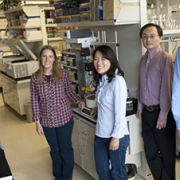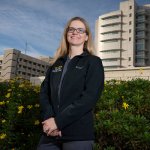UC Davis Venture Catalyst Expands Program to Accelerate Technology Commercialization with STAIR-Plus Grants — Announces Recipients

To support campus innovators in advancing their cutting-edge technologies towards commercialization, Venture Catalyst – within the Technology Management and Corporate Relations division of the UC Davis Office of Research – has offered Science Translation and Innovative Research (STAIRTM) Grants for the last four years. The unique STAIR Grant program provides funding and support to help innovators demonstrate proof-of-concept and commercial feasibility for their technologies. To date, a total of $897,000 has been awarded to 19 faculty members as part of this program.
This year, Venture Catalyst announced the addition of the STAIR-Plus™ Grant program, intended to offer additional support to STAIR Grant recipients who have successfully achieved their projected commercialization milestones and are poised for commercial impact pending completion of specific targeted activities. Each recipient receives up to $20,000 in funding to be deployed over a one-year period. Funding for the STAIR-Plus program was made possible by the State of California’s Assembly Bill 2664, which was passed in 2016.
2017 STAIR-Plus Grant Recipients

Gino Cortopassi, professor, Department of Molecular Biosciences
Transition to Patentable New Chemical Entity Shc inhibitors for Fatty Liver Disease
Cortopassi and his team have identified several compounds that inhibit Shc, a signaling protein that regulates the body’s response to insulin and resistance to pediatric nonalcoholic fatty liver disease. With assistance from the STAIR Grant, the team conducted medicinal chemistry optimization to narrow dozens of functional parent molecules down to several of the most productive candidates. The STAIR-Plus Grant will allow the team to conduct additional screening and test the two most potent inhibitors in-vivo in an animal model.

Tony Simon, professor, Department of Psychiatry and Behavioral Sciences
Translation of Neurotherapeutic Video Games to Virtual Reality
Simon has invented a “neurotherapeutic” video game designed to help improve the cognitive abilities of children with one of several genetic disorders, the healthy aging and patients with many forms of traumatic brain injury or stroke. The STAIR Grant enabled Simon and his team to build prototypes utilizing desktop computers and game consoles which were used to conduct tests to provide evidence of clinical benefit. Simon plans to use funding from the STAIR-Plus Grant to develop, with his game design partner, a second generation prototype utilizing a virtual reality platform and to conduct preliminary tests for usability and efficacy potential.
 John Voss, professor, Department of Biochemistry and Molecular Medicine
John Voss, professor, Department of Biochemistry and Molecular Medicine
A Novel Nitroxide-based Agent to Produce Contrast Enhancement for Amyloid Beta Peptide Detection by MRI
Voss’s team is developing technology based on a small molecule with potential for the early detection of Alzheimer’s disease. The compound is innovative for its paramagnetic properties, which affect MRI intensities correlating to an early and prominent marker for Alzheimer’s. Unlike available imaging methods, this approach would be less expensive, enable greater patient access and eliminate radiation exposure for the patient. Voss utilized the STAIR Grant to conduct in vivo tests to demonstrate effectiveness and to synthesize nine novel small molecules. Voss plans to use the STAIR-Plus Grant to conduct additional optimization leading to the selection of a lead candidate. He also plans to use high resolution imaging to better correlate the contrast signal with identifiable brain structures.
Each application was reviewed by the STAIR-Plus Grant review committee, which included Office of Research staff and external industry reviewers with specific domain expertise. The review committee considered the technical merit, commercial potential, outcomes from previous STAIR Grant milestones and alignment of budget with projected activities for each project.
“I’m thrilled that the California Legislature’s investment in innovation and entrepreneurship at the university is enabling us to extend the bridge between cutting-edge research and its potential for transformative human impact,” said Dushyant Pathak, associate vice chancellor of Research and executive director of Venture Catalyst. “These funds, in addition to the prior investment by the university through our STAIR Grants, are accelerating the commercialization of new technologies from UC Davis.”
An important component of the STAIR-Plus program is the engagement of award recipients with additional entrepreneurial and technology commercialization support and resources through a unique collaboration between Venture Catalyst and the UC Davis Institute for Innovation and Entrepreneurship. Each award recipient will participate in a cohort-based series of innovation and commercialization clinics focused on helping awardees develop the skills and networks needed to develop the commercial potential and resulting societal impact of their ideas.
These highly customized business clinics will include engagement with industry experts and mentors to supplement the workshops, which will be focused on commercialization elements including market and business model validation and coaching for effective business communication.
AB 2664 Spurs Innovation and Entrepreneurship
Assembly Bill 2664, also referred to as the Innovation and Entrepreneurship Expansion bill, was authored by Assemblymember Jacqui Irwin, D-Thousand Oaks, and signed last fall by Governor Jerry Brown. AB 2664 is designed to propel new innovation and entrepreneurship efforts across the University of California through investments in infrastructure, incubators and entrepreneurship education programs. The $22 million investment was dispersed equally to each of the ten UC campuses at the beginning of 2017. Venture Catalyst is the program lead at UC Davis and is implementing a variety of innovation and entrepreneurship expansion activities in conjunction with partners on campus, including the Mike and Renee Child Institute for Innovation and Entrepreneurship, the Engineering Student Startup Center, the Office of the Provost, Graduate Studies and the Internship and Career Center, as well as external community partners.




